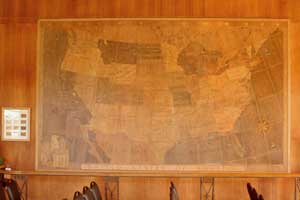
If Yellowstone National Park is on your short list of future vacation destinations, be sure to stop and see Mammoth Hot Springs Hotel on the park’s northwest corner. It’s a wonderful vintage building in its own right, but the hotel also contains a remarkable example of marquetry you won’t want to miss! I stumbled on it almost by accident while staying there for a night last summer.
On the wall of the hotel’s lounge, just off the main lobby, there’s a huge map of the United States made almost entirely of wood. Designed and assembled in 1937 by Robert C. Reamer and W. H. Fay, the map measures 17 ft. 10 in. wide by 10 ft. 4 in. tall. It contains 15 types of wood from nine countries: zebrawood (Africa), lacewood and Oriental (sic) wood (Australia), Brazilian rosewood, satinwood (Central America), East Indian rosewood, gray and white harewood (England), English oak, Honduras mahogany, teak (India), as well as slash and straight-grained walnut, maple and burl redwood from the United States.

The map consists of 2,544 pieces of inlay, which took five months to cut and assemble. (That timeframe seems almost speedy, considering the sheer scope of this project!) It was shipped in six sections from Seattle, Washington, to Yellowstone, for final installation. The map has been on display ever since. It underwent one major restoration effort that took place over several years in the mid 1990s. For a fascinating “behind the scenes” look that documents those repairs, see this link:
http://woodenobject.tripod.com/AICMap.pdf
The extraordinary thing about an inlay this big is that you can only take in its overall effect from a distance, but closer inspection reveals so many more intricate details: cities, rivers, lakes, national parks, scripted text, a compass and even a bald eagle in the lower left corner. All hand-made of wood veneer, which is stunning in its own right. Other painted embellishments, which include major highways and five depictions of sailing ships, complete the map. The net effect is pretty incredible.

Here’s a remarkable piece of craftsmanship not to be missed — and another good excuse to explore our country’s first national park.
Catch you in the shop,
Chris Marshall, Field Editor





